AMCE Film
The Fourth Middle East and Central Eurasia Ethnographic Film and Media Program
The Fourth Middle East and Central Eurasia Ethnographic Film and Media Program (AMCE) of the European Association of Social Anthropologists (EASA) will take place during the First International Biennial Conference and Graduate Workshop on The Persianate World and Central Eurasia at the Oklahoma State University (21-24 February, 2018). All students, anthropologists, sociologists, documentary filmmakers and media artists are welcome to participate in this program by submitting ethnographic videos, films (including online and cell phone styles, short and feature-length films) as well as interactive media (websites, hyperlinked documents, etc.)
The main focus for this year’s program will be on ‘The Persianate World and Central Eurasia’. However, other topics are more than welcome.
Deadline : Films and other materials submitted for the program should be submitted online or as DVD preview copies, accompanied by a synopsis, a 10-line description and technical data, no later than 30 October 2017.
Delivery and return policies :
- All entries submitted must have received their first public screening on or after 1 January 2017.
- All participants must cover all costs related to the delivery of preview and screening copies. We will not return the preview and screening copies.
- All entries should be sent to: Dr. P. Khosronejad, School of International Studies, 201 Wes Watkins Center, Stillwater, Oklahoma 74078
- Contact e-mail: Pedram.Khosronejad@okstate.edu
Third Ethnographic film and media programme of the Middle East and Central Eurasia of EASA (AMCE)
Convenor: Pedram Khosronejad (Oklahoma State University)
Program assistant: Kamnoush Khosrovani (PhD. candidate in Anthropology, GSRL : Groupe Sociétés, Religions, Laïcités, CNRS-EPHE, France)
EASA2016
We were pleased to announce the third Ethnographic Film and Media Programme of the Middle East and Central Eurasia, which is held annually in conjunction with the Anthropology of the Middle East and Central Eurasia Network of the European Association of Social Anthropologists (EASA). The goal of our programme is to promote original ethnographic films and visual media, not only in the area of anthropology, but also in sociology, folklore, religion, material culture and related topics. Our programme encompasses all areas of the contemporary Middle East and Central Eurasia (the Russian Federation, the Caucasus, Central Asia, China), including topics on minority groups and religious themes. Our main focus for this year's programme is on "war, crises, refugees, migration and Islamophobia".
Thursday 21 July
09:00-10:45: Film session 3, U6-4:
The Night of Infatuation
Nasser Saffarian (2015)
89 minutes, Iran
The Night of Infatuation is a vibrant musical documentary about Iranian music, history and culture throughout the 1900s. The documentary film retrospective is punctuated by the personal reflections of Iranian music critics, singers and composers.
11:15-13:00: Film session 4, U6-4:
Salmon, Bears, Love Dances among the Itelmen on Kamchatka
Christoph Boekel (2015)
44 minutes, Germany
As recently as the seventeenth century, the Itelmen were a population of twenty thousand, and the sole inhabitants of the southern half of Kamchatka, a large peninsula on the Pacific coast of northern Asia. The Itelmen were violently decimated in the aftermath of colonization by the Cossacks under the Russian Czar. Today, there are 1,500 Itelmen survivors – less than 1% of the Kamchatkan population. With the aid of German explorer G. W. Steller's (1709 – 1746) historic observations, they are attempting to revive parts of the ancient Itelmen culture.
The Black Flag
Majed Neisi (2015)
62 minutes, Iraq
Shi'a Muslims all over Iraq are taking up arms to combat the spread of the Islamic State. Iranian filmmaker Majed Neisi travels to the edge of Anbar Province, to embed himself with the under-equipped but determined volunteers fighting to rescue their country from the onslaught of ISIS. Filmed in the battlefield as bullets ricochet all around, The Black Flag provides a powerful look at the Shi'a men fighting the Islamic State.
Friday 22 July
09:00-10:45: Film session 5, U6-4:
Deux Fois Le neme Fleuve (Same River Twice)
Effi Weiss and Amir Borenstein (2015)
110 minutes, Belgium
In 1869, John McGregor, arrived in Palestine to explore the Jordan River. In 2011, Effi and Amir, Israelis who have been living in Europe for the past decade, set out to retrace McGregor’s steps. Against the backdrop of a mythical landscape overflowing with Israeli vacationers, they journey down the river’s path. At the same time local and foreign, they gradually transform from traveler-explorers to 'explored travelers' - as the people they meet along the way unabashedly confront them about their relationship with the land they had left. The trip raises questions of kinship and ownership, proximity and distance, and exposes the biographical and ideological filters that condition our connection to a place.
11:15-13:00: Film session 6, U6-4:
The Color of Soil
Hamed Zolfaghari (2016)
52 minutes, Iran
A group of young Iranian artists work round the clock to bring the island’s ecological richness to life, creating what they consider to be one of the largest soil carpets in the world. However some argue their environmental art work is hurting more than helping the environment. Every year a group of young Iranian artists, led by environmental artist Ahmad Kargaran, come together on Hormuz Island to create a world record environmental artwork: the largest soil carpet in the world. An astonishing range of colours coming from the different soils found across the island are used by the band of artists, working round the clock to bring this piece to life. However some people on the island don’t agree with their work and argue the carpet is more harmful than helpful for the environment. On an island with little financial means and an array of rare soils, this carpet could be just the event to boost the island’s ecological attractions, or destroy them.
I Comme Iran (I For Iran)
Sanaz Azari (2015)
50 minutes, Belgium
Brussels, behind the closed doors of a classroom. Using a textbook dating from the Islamic revolution, Sanaz Azari, the director, learns how to read and write in Persian, her mother tongue. Over the course of the lessons, the teacher initiates her to the basics of the language, which becomes a gateway to the history and culture of Iran. Gradually, the didactic method of the lessons evolves into a poetic, visual collage, which introduces the notion of freedom and questions the meaning of a revolution.
Saturday 23 July
09:00-10:45: Film session 7, U6-4:
The Tentmakers of Cairo (صانعي الخيام في القاهرة )
Kim Beamish (2015)
94 minutes, Australia
For over three years we follow a community of artisans whose craft has remained largely untouched since Pharaonic times. They try and make sense of Egypt’s recent history, as their hands stitch incredibly detailed designs. Contrasts exist not only in the imagery where art works clash with the dirt and grime of the street, but also in the social differences, wealth and political views. The shop becomes a discussion and rhetoric free space of intergenerational transmissions of timeless knowledge; the street of the tentmakers becomes a mirror of a larger public space where we read the country’s political turmoil and the external world: a vital economic and social window.
11:15-13:00: Film session 8, U6-4:
This was Hasankeyf
Tommaso Vitali (2015)
90 minutes,United Kingdom, Italy, Turkey
This is a deep political and poetic ethnography within - and a tribute to - this small community, where beauty derides death - the last possibility to live among its citizens, where the magnetic legacy of past cultures is intertwined with the desires and sorrows that the idea of Progress respectively provokes and inflicts, one sublime day living as rural heroes, exploring the petrifying perception of loss and change.
The Second Ethnographic Film and Media Program of the Middle East and Central Eurasia of EASA (European Association of Social Anthropologists)
The Department of Sociology, University of Nantes, Nantes, France, November 2015
We are pleased to announce the second Ethnographic Film and Media Program of the Middle East and Central
Eurasia, which will be held annually in conjunction with the Anthropology of the Middle East and Central Eurasia
Network of the European Association of Social Anthropologists.
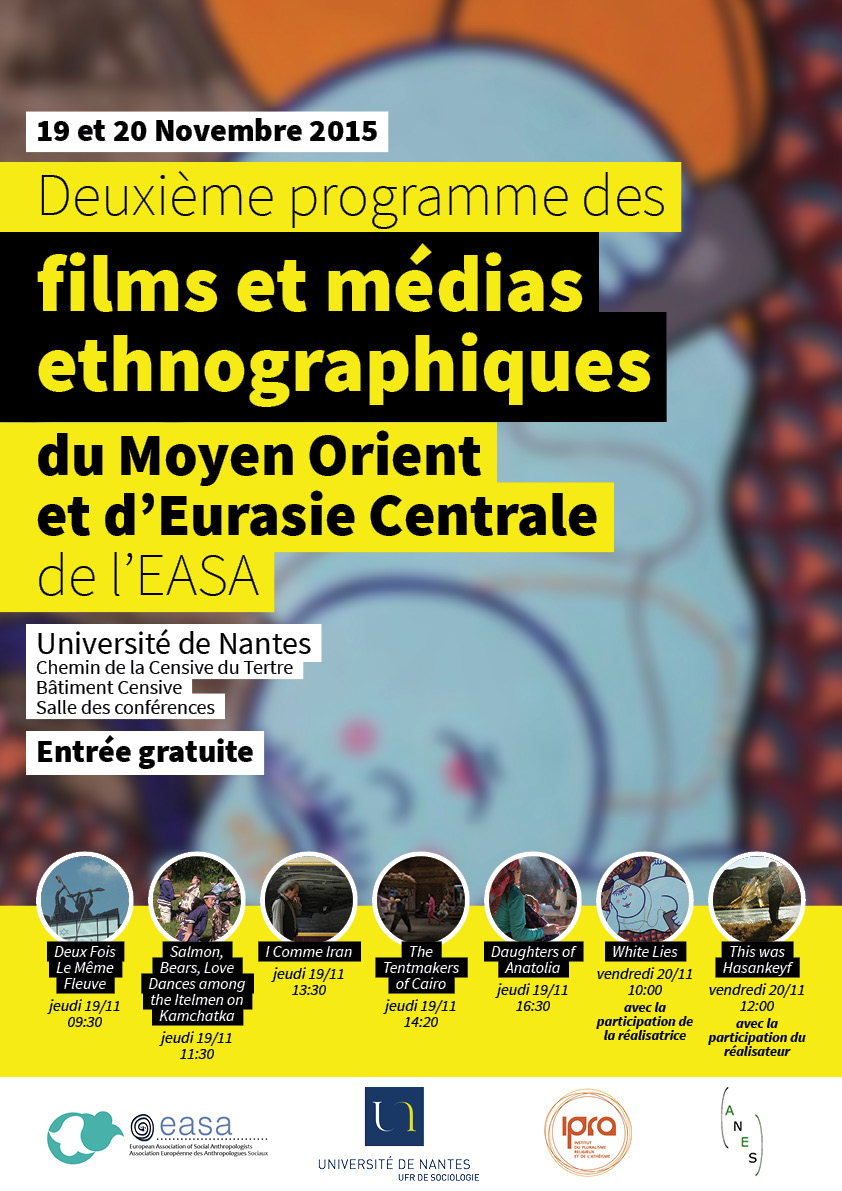 You
can now download the final PDF
programme
You
can now download the final PDF
programme![]()
Our second program will be held with the collaboration of the Department of Sociology of the University of Nantes and Institut du Pluralisme Religieux et de l'Athéisme – IPRA/MSHG (Nantes) during 19th and 20th November 2015 (University of Nantes, Nantes, France).
Curator and organiser:
Dr. P. Khosronejad (Institut du Pluralisme Religieux et de l'Athéisme – IPRA/MSHG, Nantes, France)
Daughters of Anatolia
Halé Sofia Schatz/ 2015/ 56’/ Turkey, United States

"Daughters of Anatolia" follows a Turkish family of nomadic goat herders as they travel ancient
seasonal migration routes with their 350 animals, alternating between winters on the Mediterranean and summers
in the Taurus Mountains. Focusing on the women, their work and their thoughts about their lives, the film
captures how the family relies on their goats for their sustenance and livelihood: They make, eat and sell
cheese and yogurt from the milk. They shear, spin, weave, and sell goat wool. They butcher the animals for their
own meat consumption. The family is part of the Sarıkeçili Yörük tribe in Anatolia who
have maintained their nomadic rhythms since the 12th century. Producer/Director Halé Sofia Schatz
documents a lifestyle in transition – one that has roots in ancient traditions but that now faces
challenges from an increasingly urbanized world.
Deux Fois Le Meme Fleuve (Same River Twice)
Effi Weiss and Amir Borenstein/ 2015/ 110’/ Belgium

In 1869, John McGregor, a Scottish explorer, arrives in Palestine to explore the Jordan River. In the summer of
2011, Effi and Amir, Israelis who have been living in Europe for the past decade, set out to retrace McGregor’s
steps, from the river source to the Sea of Galilee. Against the backdrop of a mythical landscape overflowing
with Israeli vacationers, they take us along on a journey down the river’s path. At the same time local
and foreign, they gradually transform from traveler-explorers to 'explored travelers' - as the people they meet
along the way unabashedly confront them about their relationship with the land they had left. The flow of
encounters, invaded landscapes and spontaneous dialogues behind the camera raise questions of kinship and
ownership, proximity and distance, and expose the biographical and ideological filters that condition our
connection to a place.
I Comme Iran (I For Iran)
Sanaz Azari/ 2015/ 50’/Belgium

Brussels, behind the closed doors of a classroom. Using a textbook dating from the Islamic revolution, Sanaz Azari, the director, learns how to read and write in Persian, her mother tongue. Over the course of the lessons, the teacher initiates her to the basics of the language, which becomes a gateway to the history and culture of Iran. Gradually, the didactic method of the lessons evolves into a poetic, visual collage, which introduces the notion of freedom and questions the meaning of a revolution.
Salmon, Bears, Love Dances among the Itelmen on Kamchatka
Christoph Boekel/ 2015/ 44’/ Germany

As recently as the seventeenth century, the Itelmen were a population of twenty thousand, and the sole
inhabitants of the southern half of Kamchatka, a large peninsula on the Pacific coast of northern Asia. The
Itelmen were violently decimated in the aftermath of colonization by the Cossacks under the Russian Czar. Today,
there are 1,500 Itelmen survivors – less than 1% of the Kamchatkan population. With the aid of German
explorer G. W. Steller's (1709 – 1746) historic observations, they are attempting to revive parts of the
ancient Itelmen culture.
This was Hasankeyf
Tommaso Vitali/ 2015/ 90’/ United Kingdom, Italy, Turkey

“This was Hasankeyf” is a deep political and poetic ethnography within - and a tribute to - this
small community, where beauty derides death - the last possibility to live among its citizens, where the
magnetic legacy of past cultures is intertwined with the desires and sorrows that the idea of Progress
respectively provokes and inflicts, one sublime day living as rural heroes, exploring the petrifying perception
of loss and change.
The Tentmakers of Cairo (صانعي الخيام في القاهرة )
Kim Beamish/ 2015/ 94’/ Australia

For over three years we follow a community of artisans whose craft has remained largely untouched since Pharaonic
times. They try and make sense of Egypt’s recent history, as their hands stitch incredibly detailed
designs. Contrasts exist not only in the imagery where art works clash with the dirt and grime of the street,
but also in the social differences, wealth and political views. The shop becomes a discussion and rhetoric free
space of intergenerational transmissions of timeless knowledge; the street of the tentmakers becomes a mirror of
a larger public space where we read the country’s political turmoil and the external world: a vital
economic and social window.
White Lies
Melanie Langpap/ 2015/ 70’/Nepal

"White Lies" explores the photographic practices of photographers based in contemporary Nepal, a
country sandwiched between China and India, some call it the "political, economic periphery". The
writing of the country's Constitution remains pending until date and since the establishment of democracy in
2006. The recording for this film took place from Nov 2013 until Jan 2014, the time of Nepal's Constituent
Assembly election. At that time one of the protagonists, a professional photojournalist says: "International
politics give a shit about Nepal". After all the election is declared as "successful, free and fair".
The goal of our program is to promote original ethnographic films and visual media, not only in the area of anthropology, but also in sociology, folklore, religion, material culture and related topics. Our program encompasses all areas of the contemporary Middle East and Central Eurasia (the Russian Federation, the Caucasus, Central Asia, China), including topics on minority groups and religious themes.
ISA - AMCE Ethnographic Film Series
Report from the fifth event of the series
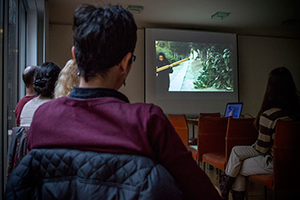
On January 27, 2015, the Austrian Academy of Sciences Institute for Social Anthropology (ISA) had the pleasure of receiving Dr. Brigitte Proksch in its headquarters in Vienna for the screening of Flowers from the Mount of Olives (2013), directed by Heilika Pikkov. Dr. Proksch is a doctor in Patrology and Eastern Christian Studies (University of Graz) and works for Forum for World Religions – Ecumenical Platform for Interreligious Dialogue and Cooperation. Pikkov’s film is an oral history of an 82 years old Estonian nun living in an Orthodox convent in Jerusalem, and Dr. Proksch enlightened the rich discussion that followed the film screening.
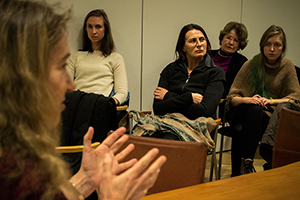
This was just the most recent screening in a series of ten, brought together by Dr. Pedram Khosronejad, director of the Anthropology of the Middle East and Central Eurasia Network (AMCE) of EASA. The series is a partnership between ISA and AMCE-EASA, the films having been selected by the latter and the event format and execution being developed by the ISA Ethnographic Film Commission, steered by Dr. Leonardo Schiocchet, Mag. Odile Kommer, and Dr. Eirik Hovden. The resulting event series, the ISA-AMCE (EASA) Ethnographic Film Series, is also supported by Ethnocineca – Ethnographic and Documentary Filmfest Vienna.
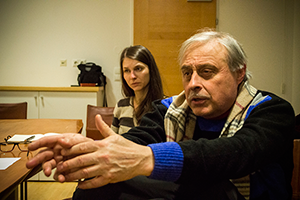
This last screening brought together around twenty participants from several different Viennese academic institutions, which has been the average for the previous six events of the series. About half of the audience attends regularly, whereas the rest tends to be composed of ad hoc scholars interested in one or another topic. The events are open to the public, and they usually count on the presence of a few university students as well. Currently, the series is taking a new dimension. Along with the EASA biannual conference screening and the Vienna based event series, new venues will be explored in 2015 with screenings also in France, Iran and Brazil.
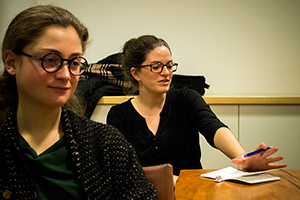
Whoever is in Vienna in the first semester of 2015, or willing to do the commute, should keep an eye on the next screenings: Mountain Men (Dan Bronfeld); Super Women (Yael Kipper & Ronen Zaretzky); Ainu: Pathways to Memory (Marcos Centeno Martín & Almudena García); and Bridging the Divide (Aliaa Remtilla). The venue is always at the ISA office at Apostelgasse 23, 1030, Vienna, while dates and discussants are to be announced at ISA’s website: www.oeaw.ac.at/sozant/
Leonardo Schiocchet
Austrian Academy of Sciences Institute for Social Anthropology
Fourth event of the series
Ashiq: The Last Troubadour / Director: Director: Xiangchen Liu (2010- 128min)
Tuesday December 16, 2014, 4.30 pm
Institute for Social Anthropology (ISA)
Seminar room 1 + 2, 1030 Vienna, Apostelgasse 23
Discussion with: Dr. Helmut Lukas (ISA)
This film follows an Ashiq, an Uyghur mystic troubadour, who lives in the southern border of the Taklamakan
desert, Xinjiang Uyghur Autonomous Region, China. Somewhat unlike what is expected from a Sufi, the Ashiq who
live in this region typically have several different jobs to support themselves economically. However, some of
them do go into seclusion to cultivate values and senses at a Mazar (an Uyghur's grave). Some of the Taklamakan
Ashiqs are blacksmiths, merchants, or barbers, while others are beggars or grave-diggers. In this region, women
can also be Ashiqs. In spite of their diverse life-styles, their singing techniques and repertoire have remained
practically the same. The chanting aims at conveying their earnest feelings to Allah and at doing penance for
their sins.
ISA AMCE Ethnographic Film Series is a series of events organized by the Institute for Social Anthropology (ISA)
in association with the Anthropology of the Middle East and Central Eurasia (AMCE) Network of the European
Association of Social Anthropologists (EASA), and supported by ethnocineca.
http://www.oeaw.ac.at/sozant/
http://www.easaonline.org/networks/amce/index.shtml
http://www.ethnocineca.at/
Third event of the series
 Cinema Palestine
Cinema Palestine
Director: Tim Schwab (2013; 78min)
Tuesday * November 18, 2014 * 4.30 pm
Institute for Social Anthropology (ISA)
Seminar room 1 + 2, 1030 Vienna, Apostelgasse 23
Discussion with: MMag.a Eva Kssner (University of Vienna)
This film focuses on the fourth wave of Palestinian cinema, running from 1980 to the present and now considered
a significant artistic force in world cinema. Films from this period have screened in major festivals, including
Cannes, Berlin, Venice and Toronto, and have won internationally renowned awards. Constructed as a series of
dialogues in which the filmmakers speak on a series of linked themes, the subjects address their ancestral
roots, their relationship to the landscape, the political situation and the concept of a Palestinian national
cinema.
ISA AMCE Ethnographic Film Series is a series of events organized by the Institute for Social Anthropology (ISA) in association with the Anthropology of the Middle East and Central Eurasia (AMCE) Network of the European Association of Social Anthropologists (EASA), and supported by ethnocineca.
http://www.oeaw.ac.at/sozant/
http://www.ethnocineca.at/
Second event of the series: ISA - AMCE Ethnographic Film Series
Behind the Wheel
Director: Elise Laker (UK, 2013) & Discussion with: Mag.a Evelyn Rainer, International Organization for
Migration (IOM), Vienna
Tuesday, 4th of November 2014, 4.30 pm
Institute for Social Anthropology (ISA)
Seminar room 1 +2, 1030 Vienna, Apostelgasse 23
ISA AMCE Ethnographic Film Series is a series of events organized by the Institute for Social Anthropology (ISA)
in association with the Anthropology of the Middle East and Central Eurasia (AMCE) Network of the European
Association of Social Anthropologists (EASA)
www.oeaw.ac.at/sozant/
www.easaonline.org/networks/amce/film.shtml
First ethnographic film and media programme
View details of the individual films here www.easaonline.org/conferences/easa2014/amce.shtml
We are pleased to announce the first Ethnographic Film and Media Program of the Middle East and Central Eurasia, which will be held annually in conjunction with the Anthropology of the Middle East and Central Eurasia Network of the European Association of Social Anthropologists (EASA).
The programme aims to promote original ethnographic films and visual media not only in the area of anthropology but also in folklore, religion, material culture and related topics. Our programme encompasses all areas of the contemporary Middle East and Central Eurasia (Russia, the Caucasus, Central Asia, China), including topics on minority groups and religious themes.
Our first programme will be held during the 13th EASA Biennial Conference, at Tallinn University, Estonia, between 31 July and 3 August 2014. We invite and encourage all students, anthropologists, documentary filmmakers and media artists to participate in our programme by submitting ethnographic videos, films (including online and cell phone styles, short and feature-length films) as well as interactive media (websites, hyperlinked documents, etc.).
Delivery and return policies
- All entries submitted must have received their first public screening on or after 1 January 2013.
- All participants must cover all costs related to the delivery of preview and screening copies.
- We will not return the preview and screening copies.






